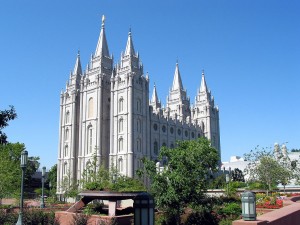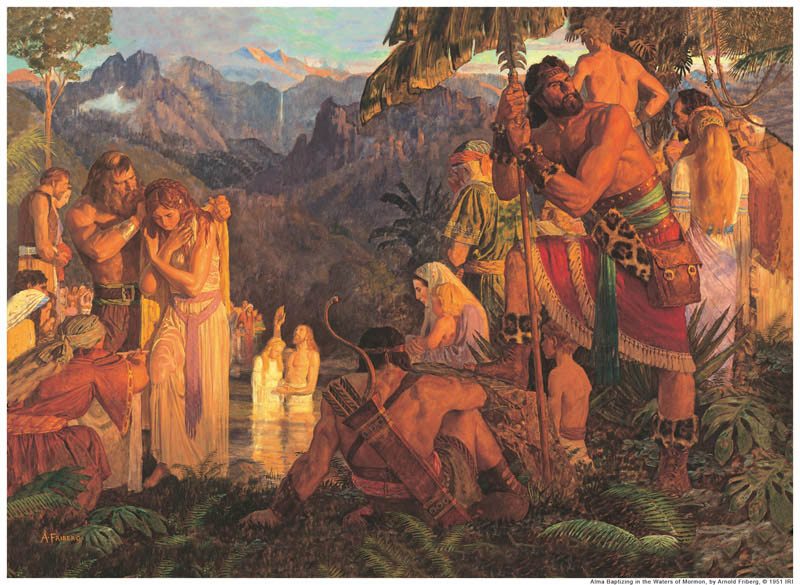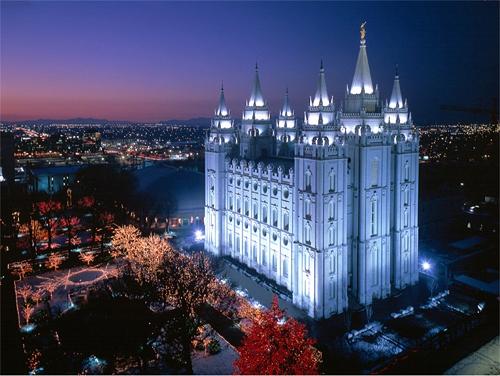The Gospel of Jesus Christ
The Gospel of Jesus Christ is the “good news” that Jesus Christ has  overcome death and sin through His sacrifice, death, and resurrection. It further means that mankind, through faith on Jesus’ name, repentance from our sins, baptism by water and by fire, and enduring to the end, can be saved because of Jesus Christ’s sacrifice. It is called the Gospel, which literally means “the good news,” because were it not for Jesus Christ and His sacrifice, no person could be saved from death and hell. The Good News is that a way has been prepared for all those who choose to follow it. The way is free and open to all.
overcome death and sin through His sacrifice, death, and resurrection. It further means that mankind, through faith on Jesus’ name, repentance from our sins, baptism by water and by fire, and enduring to the end, can be saved because of Jesus Christ’s sacrifice. It is called the Gospel, which literally means “the good news,” because were it not for Jesus Christ and His sacrifice, no person could be saved from death and hell. The Good News is that a way has been prepared for all those who choose to follow it. The way is free and open to all.
Mormons teach the Gospel of Jesus Christ as the most important message in the world, and Mormon missionaries devote their time to teaching others about the Good News. Late in his life, the Prophet Joseph Smith wrote the following:
“We believe that the first principles and ordinances of the Gospel are: first, Faith in the Lord Jesus Christ; second, Repentance; third, Baptism by immersion for the remission of sins; fourth, Laying on of hands for the gift of the Holy Ghost” (4th Article of Faith.)
This represents the basic foundation of the Gospel of Jesus Christ as taught by the Mormon Church. These steps are what a person must do to enter a covenant with Christ and enter the path that leads to Eternal Life. Mormons teach that the fullness of the Gospel (the complete teachings about the Gospel), as well as the authority to perform baptism and the covenants God makes with man, were lost from the earth in the centuries following Christ’s death and resurrection. These teachings and this authority were restored through modern day prophets beginning with Joseph Smith. Part of that restoration was the translation of the Book of Mormon, which the Lord gave to help us understand more fully this essential doctrine. In a revelation given to Joseph Smith, Jesus Christ said, “the elders, priests and teachers of this church shall teach the principles of my gospel, which are in the Bible and the Book of Mormon, in the which is the fullness of the gospel” (Doctrine & Covenants 42:12).
Faith in the Lord Jesus Christ
Paul said, “But without faith it is impossible to please him: for he that cometh to God must believe that he is, and that he is a rewarder of them that diligently seek him” (Hebrews 11:6). Without faith, we cannot be saved and hence cannot please God, who desires that all be saved. Faith means to know that God lives, but it also means to trust in Him, as Paul says, we must believe that “he is a reward of them that diligently seek him.” Unless we trust that God will fulfill His promises to us, and unless we trust God enough to keep His commandments, we do not truly have faith.
Mormons believe that our faith should be centered in Jesus Christ. Faith is more than believing Jesus exists; it means believing Him when He says that you can be forgiven of your sins and saved in His Kingdom. It means trusting in Him enough to keep the commandments and to fulfill one’s promises to God. Faith in Jesus Christ consists in trusting that He has all power and can fulfill His promises to resurrect all mankind and save from sin those who repent and follow Him. Those who have faith in God will have the courage to keep His commandments even when they are difficult.
Having faith means that you will act on your beliefs. Merely believing or thinking that there is a God or that Jesus Christ is the Savior of the world is not sufficient. Jesus said in His masterful Sermon on the Mount that, “Not every one that saith unto me, Lord, Lord, shall enter into the kingdom of heaven; but he that doeth the will of my Father which is in heaven” (Matthew 7:21). The Apostle James said of those who merely believe, but do not act on that belief: “Thou believest that there is one God; thou doest well: the devils also believe, and tremble. But wilt thou know, O vain man, that faith without works is dead?” (James 2:19-20).
 Faith is a gift from God to those who diligently seek him. We develop faith over time by opening ourselves to the influence of the Holy Spirit. The first step is to be humble and teachable. If we are arrogant, then the Spirit of God cannot work within us. We must desire to believe. Even if we cannot at first believe, we should desire to believe. The Book of Mormon compares this to planting a seed and watering it. For example, if a person wanted to know if the Book of Mormon was true, he or she would read it and ponder its teachings through sincere prayer and meditation. This is planting the seed.
Faith is a gift from God to those who diligently seek him. We develop faith over time by opening ourselves to the influence of the Holy Spirit. The first step is to be humble and teachable. If we are arrogant, then the Spirit of God cannot work within us. We must desire to believe. Even if we cannot at first believe, we should desire to believe. The Book of Mormon compares this to planting a seed and watering it. For example, if a person wanted to know if the Book of Mormon was true, he or she would read it and ponder its teachings through sincere prayer and meditation. This is planting the seed.
Next, the seed must be nourished. A person nurtures the seed through prayer, scripture study, service to others, and keeping the commandments. So, a person praying about the Book of Mormon would begin applying its teachings to his or her life. The Book of Mormon compares this to planting and watering a seed or exercising a particle of faith (see Alma 32:18-43, pgs 289-291). The Holy Spirit will enter a person’s heart and confirm that what he or she is studying and doing is correct. If we do not experiment with our faith by keeping the commandments, praying, and attending church, the Spirit will not tell us whether the scriptures are true. Therefore, faith comes as we try following and studying the scriptures. We must ask ourselves, “Could this be true?” As we live hoping and desire to know if something is true, we will come know for sure by the Holy Spirit.
Mormons strive to develop their faith through study, prayer, service, and obedience to God’s commandments. Faith is a form of spiritual work and character-shaping, in conjunction with the miracle of Christ’s Atonement. Mormons often refer to their personal faith as their testimony and describe the act of telling others about their faith as “bearing testimony.”
Repentance
The opportunity for mankind to repent is a wonderful gift from a loving Heavenly Father. Mormons believe that repentance should be viewed in a positive light as an opportunity to improve. The root of the word repentance in both Hebrew and Greek refers to a turning from sin toward God through a change of heart. Repentance does not mean merely acknowledging sin, or suffering because of our sins, but refers rather to the inner spiritual change. The Book of Mormon refers to it as a change of heart. Repentance is therefore the act of trying to bring one’s life more in accord with God’s teachings.
To repent we must learn what God expects of us, and then acknowledge our mistakes and weaknesses. We must take responsibility for our own actions and recognize that what we have done has hurt others and offended God. Second, we must confess and then forsake the sin. This means we must stop doing it and never return to it again. We must, if possible, make restitution. This means that if we stole something, we should return it or pay the person for what we took. If we lied or hurt someone’s feelings, we must apologize. Restitution is not always possible, but we must always apologize and ask for forgiveness from those we offended or hurt. God is able to heal all wounds, and when we trust in Him, we can be forgiven. Finally, we must ask for forgiveness from God through prayer.
When we have done this, we have this promise from God:
Behold, he who has repented of his sins, the same is forgiven, and I, the Lord, remember them no more. By this ye may know if a man repenteth of his sins–behold, he will confess them and forsake them (Doctrine and Covenants 58:42-43, pg 106).
When we have sincerely repented, we have God’s promise that we are forgiven, and God cannot lie. To become clean from all our sins and become a new creature in Christ, we must follow repentance with baptism. However, as everyone continues to make mistakes, we must repent throughout our lives and continually turn towards God for strength and forgiveness. Through the sacrament, which Mormons partake of every Sunday, we can renew the covenants made at baptism and thus renew the cleansing of the Holy Spirit. The Doctrine and Covenants of the Mormon Church says:
Yea, repent and be baptized, every one of you, for a remission of your sins; yea, be baptized even by water, and then cometh the baptism of fire and of the Holy Ghost. Behold, verily, verily, I say unto you, this is my gospel; and remember that they shall have faith in me or they can in nowise be saved And upon this rock I will build my church; yea, upon this rock ye are built, and if ye continue, the gates of hell shall not prevail against you (Doctrine & Covenants 33:11-13).
Baptism by Immersion for the Remission of Sins and the Baptism of Fire
Baptism by Water
Mormonism teaches the importance of baptism by one having true authority from God. The fourth Article of Faith, authored by the Prophet Joseph Smith, states that Mormons “believe that the first principles and ordinances of the Gospel are: first, Faith in the Lord Jesus Christ; second, Repentance; third, Baptism by immersion for the remission of sins; fourth, Laying on of hands for the gift of the Holy Ghost.”
 The Mormon Church practices baptism by complete immersion in water. This is symbolic of a death and burial of the carnal person, and a rebirth of the person as a disciple of Jesus Christ and a member of His Church. It also symbolizes the death, burial, and resurrection of Jesus Christ. Like many Christians, Mormons believe that a person who repents and is baptized has all prior sins forgiven and becomes clean before God.
The Mormon Church practices baptism by complete immersion in water. This is symbolic of a death and burial of the carnal person, and a rebirth of the person as a disciple of Jesus Christ and a member of His Church. It also symbolizes the death, burial, and resurrection of Jesus Christ. Like many Christians, Mormons believe that a person who repents and is baptized has all prior sins forgiven and becomes clean before God.
Baptism is also the act of making a promise to the Lord. At baptism, Mormons make a covenant, or two-way promise, with the Lord that they will take upon them the name of Christ, remember Him, and keep His commandments. In return, the Lord promises to bless faithful baptized members with the companionship of the Lord’s Spirit, or the Holy Ghost.
In the Mormon Church, baptism is never performed before a person’s eighth birthday. The age of eight was given in modern-day revelation (see Doctrine & Covenants 68:27) as the age when children become accountable for their sins, meaning that they are able to independently discern between right and wrong and have personal responsibility for their conduct. At the “age of accountability,” they are also able to understand and apply the principles of repentance. For those of sufficient age who are not unable to discern between right and wrong (because of a condition such as severe mental impairment), there is no accountability for sins and, therefore, no requirement for baptism. Such are viewed as being saved through the Atonement of Christ, as are all babies and children who die before age eight. The Book of Mormon specifically forbids the practice of infant baptism, maintaining that it is “solemn mockery before God” (See Moroni 8:4-23).
Although Jesus Himself was perfect, the Book of Mormon teaches that He was baptized to show that “he humbleth himself before the Father, and witnesseth unto the Father that he would be obedient unto him in keeping his commandments” (2 Nephi 31:7). Small children are not capable of making such a commitment, so again, they have no need of baptism.
Baptism is only recognized as valid when it is performed by someone holding the proper priesthood authority. Mormonism’s claim to having the true gospel of Jesus Christ is maintained primarily on the basis of divinely given authority (the priesthood) and continuing revelation.
Similar to the beliefs of many Christian denominations, Mormons believe that baptism is a prerequisite to entering the kingdom of God in the hereafter. This belief presents a problem, however, for the millions of people who have lived and died without the opportunity to ever hear of Jesus Christ, let alone have the chance to be baptized. For this reason, Mormons believe in the ordinance of performing baptisms on behalf of those who have died. This work is done only in Mormon temples and is performed by someone acting as proxy for a deceased person. Mormons believe that this ordinance, known as baptism for the dead, is only of value to the deceased when the person accepts the work done in his or her behalf. If the ordinance is indeed accepted, the person will be able to enter the kingdom of God just as if he or she had had the opportunity to be taught and baptized while living on earth.
Mormons do believe that even after baptism, members will still make mistakes. In the partaking of the sacrament weekly, Mormons have the opportunity to renew the promises to the Lord they made at baptism. This includes the chance to come away feeling totally forgiven and perfectly cleansed of all the minor misdeeds of the previous week. Mormons believe the feeling of being purified on a weekly basis can motivate one to avoid sin. The blessings of baptism offer individuals hope through the Atonement and infinite love of the Savior Jesus Christ.
Baptism by Fire and the Holy Ghost
After being baptized, Mormons receive the gift of the Holy Ghost. Unlike the occasional power of the Holy Ghost–felt, for example, by people when they are earnestly investigating the Church–the gift of the Holy Ghost is more permanent. As Joseph Smith wrote in the fourth Article of Faith, it is bestowed by the laying on of hands upon the head of the recipient. This means that men who hold priesthood power will lay their hands upon the head of the person receiving the blessing, and one man will pronounce a special blessing, giving the gift of the Holy Ghost. The person thereafter has the continual companionship of God’s Spirit to direct, warn, and comfort him or her. If the person sins, the Holy Ghost departs. But when the person repents and strives to be righteous, worthy, and receptive, the Holy Ghost can provide great blessings of understanding, protection, and peace.
Enduring to the End
Jesus Christ said to his disciples, “strait is the gate, and narrow is the way, which leadeth unto life, and few there be that find it” (Matthew 7:14). Baptism in the name of Jesus Christ is the gate that leads to the Way. The Book of Mormon teaches this more clearly:
For the gate by which ye should enter is repentance and baptism by water; and then cometh a remission of your sins by fire and by the Holy Ghost. And then are ye in this strait and narrow path which leads to eternal life; yea, ye have entered in by the gate; ye have done according to the commandments of the Father and the Son; and ye have received the Holy Ghost, which witnesses of the Father and the Son, unto the fulfilling of the promise which he hath made, that if ye entered in by the way ye should receive (2 Nephi 31:17-18; pg 114).
Once we have entered the path, we must continue on the path that leads to Eternal Life. Mormons call this “enduring to the end.” Again, the Book of Mormon gives us a good explanation of what this means. It says:
Wherefore, ye must press forward with a steadfastness in Christ, having a perfect brightness of hope, and a love of God and of all men. Wherefore, if ye shall press forward, feasting upon the word of Christ, and endure to the end, behold, thus saith the Father: Ye shall have eternal life (2 Nephi 31:20; pg 114).
We must endure with steadiness in obedience to Jesus Christ’s commands, being filled with hope and love. We must feast on Christ’s words, which means we must continue to study His words in the scriptures and as given by revelation through living prophets. This corresponds to what the Apostle Paul said as he discussed faith, hope, and charity (see 1 Corinthians 13).
Enduring to the end does not means that Mormons expect to be perfect. Part of enduring is continuing to improve oneself through repentance whenever something is out of harmony with God’s will. Because people continue to make mistakes, the Lord has provided a way to renew these covenants. Every Sunday, Mormons partake of the Sacrament, usually called the Eucharist or Lord’s Supper in other churches. The Sacrament consists of broken bread and water to symbolize the body and blood of Jesus Christ. For faithful Mormons this represents a renewal of the covenants and commitments made at baptism and an opportunity to meditate upon the atoning mission of Jesus Christ.
Enduring to the end also requires service to others. The Book of Mormon teaches that “when ye are in the service of your fellow beings, ye are only in the service of your God” (Mosiah 2:17; pg 148). A person endures by growing in Godly attributes. Elder Dallin H. Oaks, an Apostle in the Mormon Church said:
The Apostle Paul taught that the Lord’s teachings and teachers were given that we may all attain “the measure of the stature of the fulness of Christ” (Eph. 4:13). This process requires far more than acquiring knowledge. It is not even enough for us to be convinced of the gospel; we must act and think so that we are converted by it. In contrast to the institutions of the world, which teach us to know something, the gospel of Jesus Christ challenges us to become something (The Challenge to Become, Conference Report, October 2000).
He says further,
From such teachings we conclude that the Final Judgment is not just an evaluation of a sum total of good and evil acts–what we have done. It is an acknowledgment of the final effect of our acts and thoughts–what we have become. It is not enough for anyone just to go through the motions. The commandments, ordinances, and covenants of the gospel are not a list of deposits required to be made in some heavenly account. The gospel of Jesus Christ is a plan that shows us how to become what our Heavenly Father desires us to become.
Peter said something similar in his general epistle. He counseled the righteous followers of Christ in his day to become “partakers of the divine nature, having escaped the corruption that is in the world through lust” (2 Peter 1:4). To do these, he says, we must “add to [our] faith virtue; and to virtue knowledge; and to knowledge temperance; and to temperance patience; and to patience godliness; and to godliness brotherly kindness; and to brotherly kindness charity” (2 Peter 1:5-7).
The Book of Mormon described one individual who endured righteously. His name was Ether, and he was a prophet to a wicked people. Of him, the Book of Mormon says:
For he did cry from the morning, even until the going down of the sun, exhorting the people to believe in God unto repentance lest they should be destroyed, saying unto them that by faith all things are fulfilled—Wherefore, whoso believeth in God might with surety hope for a better world, yea, even a place at the right hand of God, which hope cometh of faith, maketh an anchor to the souls of men, which would make them sure and steadfast, always abounding in good works, be led to glorify God (Ether 12:3-4, pg 509).
This path of hope and faith in God which brings men to do good is the narrow path that Jesus spoke of that leads us toward Eternal Life, which is to know Jesus Christ and God (see John 17:3), because we have become like them (see 1 John 3:2). Then, through power of the Atonement and resurrection of Jesus Christ, those who have followed this path will be cleansed from their sins and taken at last to Heaven to dwell with Christ and God forever.
About Anita Stansfield
Anita Stansfield began writing at the age of sixteen, and her first novel was published sixteen years later. For more than fifteen years she has been the number-one best-selling author of women’s fiction in the LDS market. Her novels range from historical to contemporary and cover a wide gamut of social and emotional issues that explore the human experience through memorable characters and unpredictable plots. She has received many awards, including a special award for pioneering new ground in LDS fiction, the Lifetime Achievement Award from the Whitney Academy for LDS Literature, and also a Lifetime Achievement Award from her publisher, Covenant Communications. She has fifty-six published books. Anita is the mother of five, and has three grandchildren.



 Watch a video about the restoration of the gospel on lds.org
Watch a video about the restoration of the gospel on lds.org